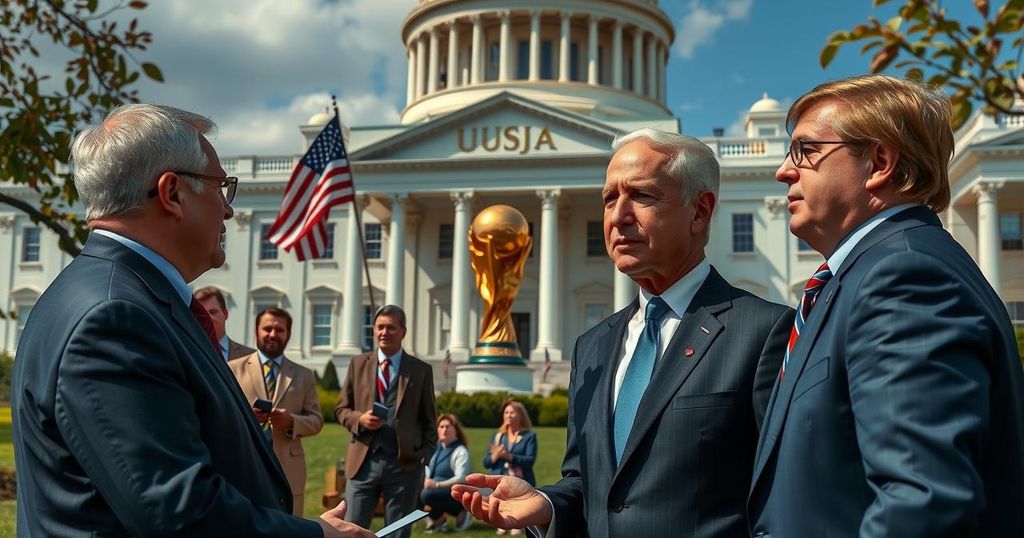U.S. Senators Urge FIFA to Avoid Saudi Arabia as 2034 World Cup Host

Two U.S. senators have urged FIFA not to select Saudi Arabia as the host for the 2034 World Cup, citing serious concerns over the kingdom’s human rights violations. They advocated for a country with a better human rights record, emphasizing potential dangers to workers and journalists. The senators criticized FIFA’s lack of thorough evaluation in relation to the human rights risks linked to Saudi Arabia’s bid.
In a recent development, two United States senators, Ron Wyden of Oregon and Dick Durbin of Illinois, have expressed their concerns regarding Saudi Arabia’s potential selection as the host for the 2034 World Cup by FIFA. Citing the kingdom’s longstanding human rights violations, the senators implored FIFA President Gianni Infantino to consider a host country that demonstrates a stronger commitment to human rights. As Saudi Arabia emerged as the sole candidate following a hastily organized nomination process last year, the urgency of taking these concerns into account has become increasingly significant.
The senators argue that approving the Saudi bid poses dangers not only to workers and athletes but also to tourists and journalists, contravening FIFA’s own established human rights standards. In their letter, they highlighted ongoing issues such as torture of dissidents, discrimination against the LGBTQ+ community, and the repression of civil liberties in Saudi Arabia. While officials from the Saudi government cited reforms aimed at enhancing women’s rights, these proclamations have not alleviated international scrutiny regarding the nation’s human rights record.
FIFA’s processes for evaluating World Cup candidates necessitate a review of human rights risks associated with hosting the tournament. However, a recent analysis conducted by law firm Clifford Chance faced criticism for allegedly lacking independence and comprehensiveness. The senators reiterated that Saudi Arabia has yet to adequately demonstrate how it would ensure labor protections, press freedoms, and inclusion practices. They firmly urged FIFA to reconsider Saudi Arabia’s qualifications before the impending decision next month, advocating for the selection of a host country that upholds human rights.
FIFA faces a crucial decision on December 11, when more than 200 member federations will likely endorse the Saudi bid. The senators’ appeal emphasizes the importance of maintaining ethical standards in the global sporting arena.
In conclusion, the concerns raised by Senators Wyden and Durbin regarding Saudi Arabia’s candidacy for the 2034 World Cup underscore significant human rights risks. Their critical stance serves as a reminder of the responsibility that organizations such as FIFA have to uphold human rights in sports, thereby ensuring that international tournaments reflect democratic values and protect the rights of all individuals involved.
The senators urged, “Approving Saudi Arabia’s bid this December endangers workers, athletes, tourists, and members of the press, and it runs counter to FIFA’s own human rights policies.” – Associated Press.
The article discusses the concerns raised by U.S. senators regarding FIFA’s potential decision to name Saudi Arabia the host of the 2034 World Cup. This issue has emerged against the backdrop of Saudi Arabia’s controversial human rights record, which includes allegations of torture, discrimination, and repression of civil liberties. The senators’ intervention highlights the ethical obligations of international sporting bodies like FIFA in considering the implications of hosting such significant events in countries with poor human rights histories. The backdrop of this situation includes FIFA’s previous actions in Qatar and ongoing scrutiny of workers’ rights in mega-sporting events.
In summary, the request by Senators Wyden and Durbin to reconsider Saudi Arabia as the host of the 2034 World Cup emphasizes a broader ethical dilemma in international sports. With a focus on human rights, the senators advocate for accountability from FIFA and the necessity for host countries to adhere to fundamental human rights principles. The forthcoming decision will be critical not only for the reputation of FIFA but also for the safety and rights of those involved in the event.
Original Source: apnews.com








